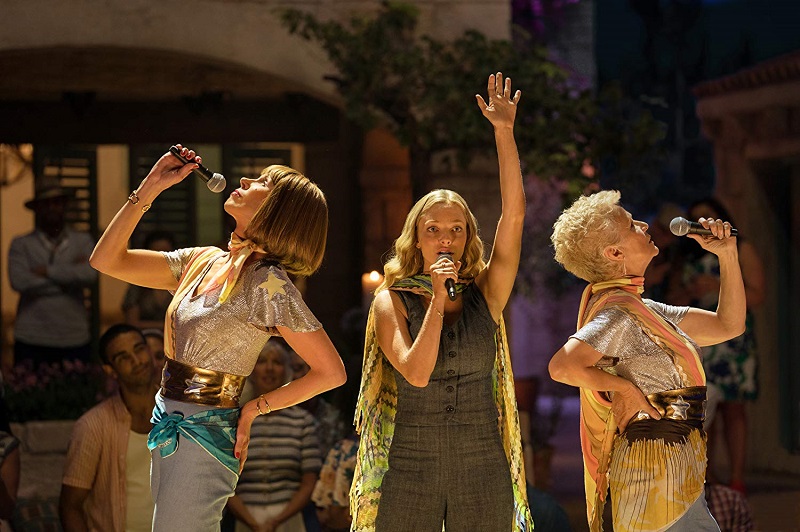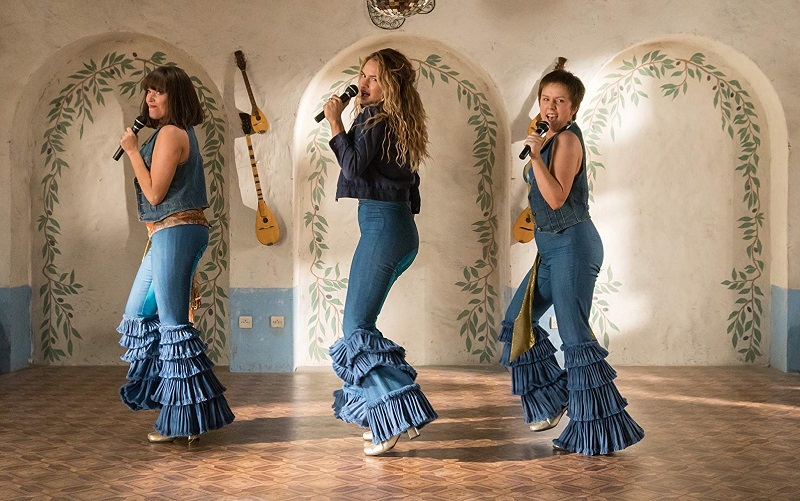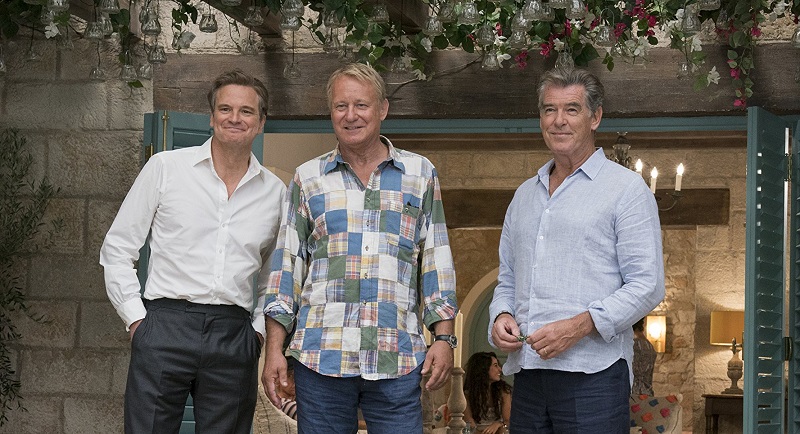Mamma Mia: Here We Go Again was not made for the masses. It was firmly crafted with an extraordinary amount of love for Mamma Mia fans and the hundreds of millions who adore the musical mastery of those Swedish pop perfectionists, ABBA.
The 2008 film Mamma Mia itself was based on the smash stage musical and told the story of Sophie, her wedding, her mother and their Greek island home as the young bride-to-be becomes obsessed with being walked down the aisle by her father—even if she doesn’t know which one of three men it could be. This all told through the music, and more importantly—the lyrics, of the prolific pop culture Scandinavian legends.
Mamma Mia: Here We Go Again tells its tale through what may be seen as some lesser known ABBA hits, but in the end, triumphs more than the original exactly due to that fact. Proof of that arrives in one of the first songs, When I Kissed the Teacher—told through a flashback. That storytelling method is the heart and soul of the sequel to the hit film from a decade prior.
Sophie (Amanda Seyfried) is reopening her mother’s Greek isle hotel and having a lavish party to celebrate. As she prepares for the big night, she heads down memory lane to discover exactly how her mother, Donna (Meryl Streep), met those three dashing dudes in 1979. We get to see it through the mesmerizing as the Greek sea eyes of young Donna (expertly cast Lily James) as she strikes out on her own after college graduation.
The story crisscrosses back and forth between the decades and in a manner that is as smooth as that ABBA heavenly harmony. Often films employing such dramatic means of storytelling get mired in a chunkiness that breaks up the forward momentum of the whole of the story. Not so here, and that largely has to do with how the band’s songs are employed and of course the stunning casting of both young and old(er) members of this ensemble.
Leading the pack of awesomeness is James. The Cinderella and Baby Driver star is impeccable as not only Donna, but truthfully a youthful Meryl Streep. She gets her verbal delivery, sure, but also her cadence, walk and even subtle personal ticks that make each of us true individuals. She gives a performance that is indicative of her flora name. It is cheerily colorful and delightfully carries the emotional weight of the entire film. Mamma Mia: Here We Go Again does not work in the least without her talents, charm and resonance. It had to be the most simultaneously exciting and nerve inducing effort stepping into those disco boots of Streep. She is thought of by many as the best actress of her or any generation. Yet, James makes it look easy—like effervescently effortless.
The actors who embody the young Sam (Pierce Brosnan), Harry (Colin Firth) and the Swedish stud, Bill (Stellan Skarsgård) are astounding. The titanic trio of young talent is a marvel and kudos to the casting department for utterly nailing it.
Jeremy Irvine mirrors Sam’s piercing good looks while celebrating his debonair demeanor and searing sensitivity. As we know from Mamma Mia, things didn’t end so well for Donna and Sam back in the day, but by the close of that first movie, the pair make up for lost time. Those seeds are laid in the scenes between James and Irvine that mirror the adoring chemistry Brosnan and Streep possess in the first film. Meanwhile, achieving the impossible is Hugh Skinner. His channeling of Firth’s awkward, yet undeniable attractiveness as Harry is uncanny. When his e out Waterloo in a French café early in the film, it is a seismic announcement that this British actor could easily have a career mirroring the man who portrays the senior Harry. Then, there’s the blinding beauty of what Josh Dylan brings to the youthful Bill. The physical dynamic between the actors’ appearance is the subject of a fantastic joke in the second act.
The addition of Cher is fantastic. Sure, it’s a little hard to accept that she is playing Streep’s mother. But… it’s Cher! And hearing her sing Fernando and the context with which its delivered, is another spoke in the highlight wheel of Mamma Mia: Here We Go Again. Andy Garcia is terrific too…
Jessica Keenan Wynn’s younger Tanya is something else. The actress could have done an impression of Christine Baranski’s character. But, that would have been two-dimensional and that is not at all what a Mamma Mia experience is on any level. It is a movie experience that explodes off the screen. Then, there’s Alexa Davies’s take on Julie Walters’ Rosie. She matches a screen acting titan like Walters note for note, literally and figuratively. Both versions of Donna and the Dynamos are deliciously dynamic in every sense.
See, that’s the thing about a Mamma Mia movie. It doesn’t take itself too seriously. Even though the band that provides the succulent sonic surroundings in the film deserves to be taken seriously for its rich and intelligent contribution to the musical menagerie that is pop music, both films are pure saccharine joy of the highest order. Yet, unlike that sweet lusciousness, the joy of these films remains with you long after the credits roll. Do not be surprised if you find yourself playing ABBA songs all the way home… and beyond.
The first film’s place in Hollywood history is cemented by how a ten-year-old story has garnered such a demand for a second one. The next chapter does something extraordinary. It lays out a dramatic story that had to be much more challenging to paint a cinematic picture with the lyrics of songs that are lesser known by a mass audience as those that inhabit the first film’s soundtrack. Sure, we get a rousing rendition of Dancing Queen in Mamma Mia: Here We Go Again, and of course James and her pals’ version of the title song.
But filmmakers, including ABBA founders Bjorn Ulvaeus and Benny Andersson (who is in the movie!), had to go deep to not repeat what was achieved a decade before. Choosing songs like One of Us to chronicle the troubles that Sophie is having with Sky (Dominic Cooper), Why Did It Have to Be Me—which flawlessly encapsulates young Donna’s well documented romantic entanglements and My Love, My Life will simply have you in tears with its power. One can see, in many ways, why this film took 10 years to come to life. It was a herculean effort to craft a symbiotic story and song that shines.
Then again, things happen for a reason. If it had happened sooner, James would not have been the lynchpin that holds this entire explosion of Greek sun-soaked joy together—and this thing would never have taken off the ground.
Grade: A-




